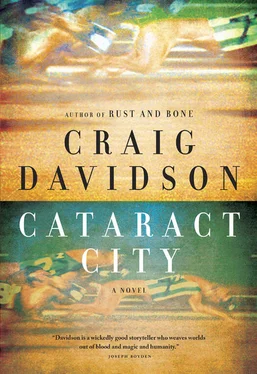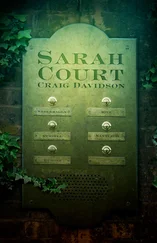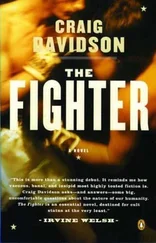As you get older, the texture of your fear changes. You’re no longer scared of a dead wrestler stalking you through the woods — even if your mind wants to go there, it’s lost the nimbleness to make those fantastic leaps of imagination. Your fears become adult ones: of crushing debts and extra responsibilities, sick parents and sick kids and dying without love. Fears of not being the man you thought you’d become back when you still believed wrestling was real and that you’d die in convulsions if you inhaled the white gas from a shattered light bulb.
“Hey, Owe?”
“Yeah?”
“Want to tell another story?”
“What kind of story?”
“Like last night. The dogs.”
“That wasn’t really a story,” I said. “Just something silly.”
“Anyway, if you wanted.”
I thought about it. The gears in my head meshed with a clicka-clicka-click , and soon the story was gushing out of me.
“There’s a place behind Niagara Falls, okay? Behind the water. Back there the rock is dark and dripping … it shines in the water that’s always falling. A man lives there. He’s been there since the Falls have. He’s old as the dinosaurs — older maybe. He’s short as a kindergartener. You can see his elbows and his knees and knuckles through his skin, which covers his bones like Vaseline. His body glows like those fish in the deepest parts of the ocean, the ones you can only see through submarine windows, right? He has no hair and his head is big and bulgy. Veins twist over it, but they’re not blue like the veins on my grandma’s arms because … there’s no blood. The man is filled with something else. He can’t hear anymore. The crash of water, it broke his eardrums. His eyes are milky marbles but he can see very well. The man doesn’t have a name because he comes from a time before anyone was around to give him one.
“There’s a tree behind the Falls, too. It grows out of the rock. The bark is the colour of fingernails and the branches reach high into the rock above. The tree has no top or bottom. It grows at both ends. The man sleeps in the tree … Actually, he doesn’t sleep. But he slips into a hole in the tree, which is hollow, and stands inside. This is the only place he can hear. He listens to the water rushing on the surface, the buzz of bugs and birds flapping their wings and fish flipping their tails.
“A shovel is leaned against the tree. The blade is old and chipped. Behind the tree is a patch of dirt … except not dirt. Black rock, like the charcoal that comes in those bags you buy at Canadian Tire … You know people go over the Falls, right? They used to do it in barrels. Other people got lost in the dark and fell or got drunk and … or they jumped. Most of them, you can’t even find their bodies. People think they get torn apart or trapped between rocks with the water pounding down. But they’re not lost. He finds them.
“The man has a net,” I said, “made from the thinnest threads. Thinner than fishing line or even spider’s web. He walks to the edge of the water and throws it. He pulls in the bodies of those who went over. It takes him a long time. His face crunches up and the veins swell on his skull. It is hard work, and very lonely.
“The bodies don’t always look so good. They are broken in many places. Sometimes he’s got to throw the net more than once. When he has all the pieces he digs a hole in that splintery rock and buries the body upside down, legs facing up and head pointing down. Only the feet poke out.
“It’s a special garden. Whatever’s planted grows the wrong way, down instead of up. The feet keep going down into it — first the ankles then the heels then the toes. It’s a swallowing garden. Before long it’s empty again.”
Dunk said: “Where do they go?”
“Wherever’s under the Falls. Nobody has ever come back … except one. That was a man who went over the night before he was supposed to get married. Everyone thought he’d died in the plunge. His parents had a funeral. They put sacks of flour in the coffin. But five years later … he was naked, the way Mrs. Lovegrove was that one time. Walking down the low road along the river. His body was perfect. Not a scratch. He looked younger than when he’d gone over. He was smiling at first, but soon he started to cry. The loudest and scariest, the most awful-sad cry you’ve ever heard. When a car stopped and the driver asked what was wrong, he said, ‘I wandered away. Why did I do that? It was so, so … perfect .’ Next his heart blew up. It popped like a balloon in his chest and he died.”
“What was so perfect?”
After a while I said, “Who knows?”
“That’s cheating.”
But even back then I knew cheating was a big part of telling a story.
“That’s BS, Owe,” Duncan persisted. “Sincerely.”
“How can you ask someone to tell a story then call BS when it doesn’t turn out the way you want?”
“Aw, maaan . What a gyp.” Dunk stirred the coals with a stick and grinned crookedly across the flames. “Still, cool story. A swallowing garden. Creepy .”
I closed my eyes. Firelight wavered against my eyelids. I thought about how I could fall asleep right there on the rocks — but if I did and if things stayed perfectly quiet, if the fire died and I felt nothing, I might never wake up. Whatever it was that usually pulled me back into the waking world just wouldn’t be there. I’d be too deep in dreams. And that didn’t really seem so bad.
“Hey, Owe?”
“Yeah?”
“I knew about the lead in the car.”
“What?”
“In the Kub Kar. I was there when my dad cut the hole. We melted the lead down in one of Mom’s old pots. It splashed Dad’s hand and left a red mark.”
“Why?”
“… I wanted Dad to win. He wanted me to win. It seemed really important to both of us, but when I think about it now I can’t remember why.”
The resigned slump of his shoulders reminded me of Dunk’s father when Mr. Lowery took his penknife to their car, flicking the metal cube onto the gym floor.
“People aren’t ever gonna let it go,” he said.
Which was true. Cataract City didn’t surrender such things so easily. Dunk Diggs, the boy who’d cheated at the Kub Kar Rally. Son carrying the sins of his father — but what had Mr. Diggs done, really, that all the other fathers hadn’t? You could’ve hacked apart any one of those cars and probably found it pumped full of lead. It was just Dunk’s bad luck to get caught.
“Everyone’s gonna forget, man.”
“Nobody ever really forgets, Owe. They just pretend to.”
Noise came from below: a steady scrape and grind, drawing closer. It wasn’t an animal — although how could I be so sure? Was I so locked into the rhythms of the woods that I could now recognize their sounds? It wasn’t Bruiser Mahoney, either — by then I lacked the energy to summon horrors that weren’t real and immediate. I knew Bruiser Mahoney was where we’d left him, dead in a tent with a rock on his gut.
A shape solidified. A man was clambering up the steep grade, boots gritting on the stones.
“It’s just little ol’ me,” he said.
His head just about brushed the top of the cave. His legs and arms seemed to have more joints than they ought to, as if extra kneecaps and elbows lurked under his faded, streaked clothes. His hands hung from frayed sleeves that stopped halfway up his wrists, below which his long fingers twitched like a puppeteer’s working a marionette. His face seemed to rotate in many directions. There was a yellow catlike tinge to his eyeballs.
“A voice told me to step into the light, so here I am.” He dropped his pack and sat, grabbing each ankle and drawing them under his thighs. He smelled of dust and of something I couldn’t name, something sweetly foul like the glop at the bottom of a carnival trashcan. “What are you doing out here all alone?”
Читать дальше












